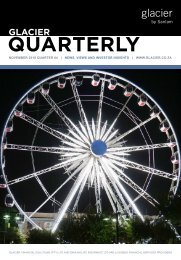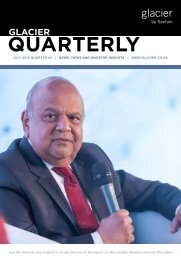Glacier Quarterly 1 - 2018
In this first edition of Glacier Quarterly for 2018, we cast our gaze across the year ahead – with a little more positivity than in previous years.
In this first edition of Glacier Quarterly for 2018, we cast our gaze across the year ahead – with a little more positivity than in previous years.
Create successful ePaper yourself
Turn your PDF publications into a flip-book with our unique Google optimized e-Paper software.
POLITICS<br />
Why did Ramaphosa appoint such amazing individuals to the top<br />
jobs in the economic portfolios yet retain some seriously questionable<br />
individuals in others? The fact is that the ANC is still a divided house.<br />
Ramaphosa’s reformist agenda will continue to be pushed back by<br />
some within his own party because he is not totally in charge.<br />
With his slim majority at the ANC conference in December, plus a<br />
deeply divided ANC top six, concessions had to be made to the losing<br />
side. Thus elements that had been discredited and yet were key to the<br />
Nkosazana Dlamini-Zuma ticket were accommodated in the Cabinet<br />
reshuffle. It doesn’t mean they are there to stay. Ramaphosa himself<br />
has said that this is a transitional arrangement, meaning that once he<br />
has amassed enough power and sway within the National Executive<br />
Committee of the ANC, further change will come. Our expectation<br />
is that a slimmer Cabinet, with fewer than 30 members, will be<br />
announced after the 2019 elections. Then the dead wood will go.<br />
There will be many other bumps on the political road ahead.<br />
The first point of uncertainty is land expropriation without<br />
compensation. Just a day after Ramaphosa’s Cabinet announcement<br />
the National Assembly adopted a motion to investigate and review the<br />
feasibility of land expropriation without compensation. It was an EFF<br />
motion amended by the ANC.<br />
This is a challenge for the Ramaphosa administration. Until clarity<br />
and certainty about the road ahead can be brought to bear on the<br />
issue, many will worry about what this means for the meaning and<br />
upholding of property rights in South Africa. Ramaphosa, a former<br />
businessman who is as affected by these issues as many investors<br />
fretting about them, must surely be seized with the fact that such<br />
uncertainty means a potential freeze on investment. Will he act swiftly,<br />
slowly or play the long game?<br />
The first point of<br />
uncertainty is land<br />
expropriation without<br />
compensation<br />
This is therefore the trend we find ourselves in for the next year:<br />
the Ramaphosa rally will continue, but it will be muted by events such<br />
as unclear policies (such as that over land and the National Health<br />
Insurance scheme) and the reality of having poor ministers in place in<br />
some portfolios.<br />
South Africa’s political life through the ages has never been a<br />
straight line. It’s full of progress and setbacks. This year promises to be<br />
the same. Fortunately, with Ramaphosa at the helm of the ANC, we still<br />
see more positives than negatives.<br />
Justice Malala<br />
Political commentator,<br />
newspaper columnist, public<br />
speaker and bestselling author






